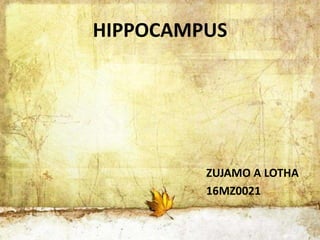Hippocampus2
- 2. CONTROL CENTERS IN BRAIN. 1)Frontal lobe: Personality, behavior, emotions Judgment, planning, problem solving 2)Parietal lobe: Interprets language, words Sense of touch, pain, temperature (sensory strip) 3)Medial Temporal lobe : HIPPOCAMPUS. 4)Occipital lobe: Interprets vision (color, light, movement) 5)Limbic lobe: emotion, behavior, motivation, long-term memory, and olfaction
- 4. HIPPOCAMPUS Greek. “Hippo” for Horse “Kampos” for sea. Venetian Anatomist Julies Caesar Aranzi 1587 Silk worm A parisian surgeon Rene Jacques ”Cornu Ammonis ”Horn of Amun an ancient Egyptian God.
- 7. Evolution
- 8. In Birds: It is very significant in Birds(Medial pallium) that sometimes it is called as “Avian hippocampus” Birds that catches prey has a larger Hippocampus the non catching birds. if there hippocampus is damaged then there efficiency reduces.
- 9. In fishes: Brain structure is different from that of vertebrates hippocampus and medial pallium birds it is not the medial Pallium.In fishes the lateral pallium is the center for memory,damaged to which can cause in cognition. That is they forget the area where they live.
- 10. In Mammals: Two halves on the right and left side of the brain temporal medial lobe(Platypus-primates) Size : of 3-3.5 cm in human, it can vary in species but shape is almost similar. Hippocampus is larger in female which explains why woman can remember more then man.
- 11. Physiology Hippocampus contains a high proportion of receptors for the stress hormone glucocorticoids, which means the hippo campus is more prone to stress Steroids can also reduce the excitability of some neurons in formation of memory.
- 12. Formation of memories Location for short term memory it serves as a “ Gateway.” Temporary info are stored before it matures and passed on to the permanent storage. Neurons are present inside the hippocampus which may be responsible for memory retention. Research on Epileptic patients. Research on monkeys.
- 13. Damage to hippocampus 1)Carbon monoxide poisoning. 2)Stroke. 3)Near Drowning/Near suffocation. 4)Epilepsy. 5)Hypoxia.
- 14. Results of damage to Hippocampus. Anterograde amnesia: Selective memory deficit,Short term memory loss,Before the injury is remembered but not after.New skills can be inculcated by therapy.
- 15. Alzheimer diseases: There may be disorientation (e.g. getting lost in familiar surroundings), problems with routine tasks (like using a microwave), and changes in personality and judgment.
- 16. CONCLUSION There is more research going on to find the exact role of hippocampus in memory formation and the consequences of its damage.
- 17. Reference Squire Larry R, Schacter Daniel L, Neuropsychology of memory, The Guilford Press New york London p519 Edited. • Hippocampus-Functions http://www.news- medical.net/health/Hippocampus-Functions.aspx • episodic-memory- http://www.iflscience.com/brain/episodic-memory- formation-hippocampus/ • Anterograde amnesiahttp://www.memorylossonline.com/glossary/ anterogradeamnesia.html. • https://www.mayfieldclinic.com/PE-AnatBrain.html
- 18. • Sciencedailyhttps://www.sciencedaily.com/releas es/2004/05/040513010413.html • hippocampus http://www.healthline.com/human-body- maps/hippocampus. • Anatbrain https://www.mayfieldclinic.com/PE- AnatBrain.html • gasattackhttp://www.memorylossonline.com/gas attack.html


















